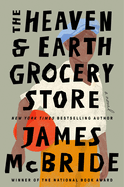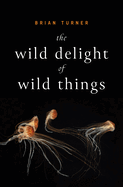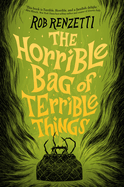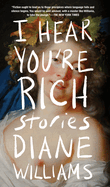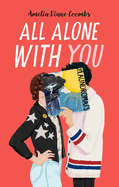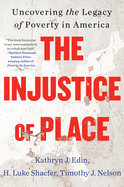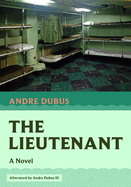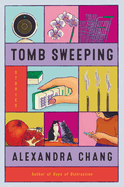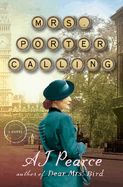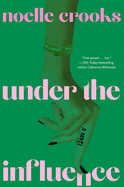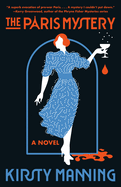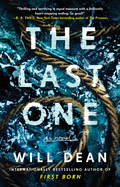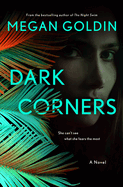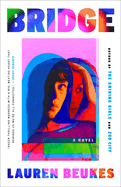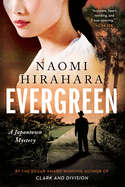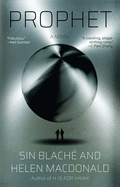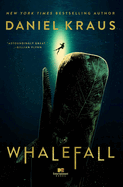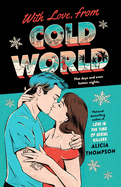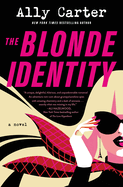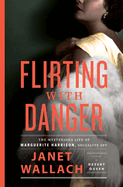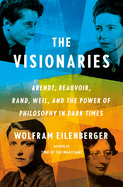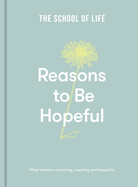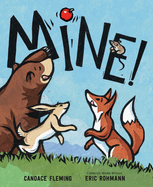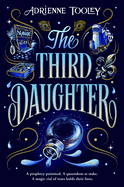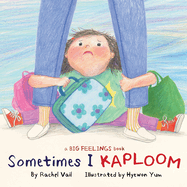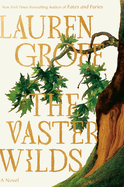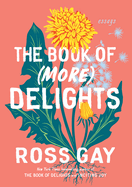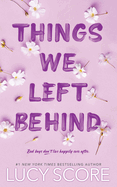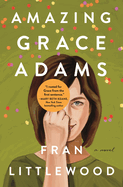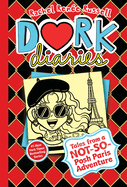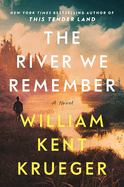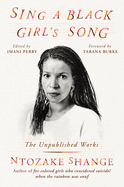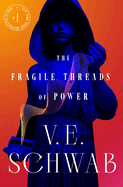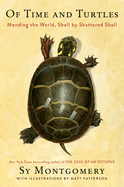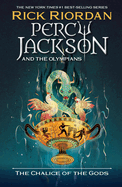Friday, August 11, 2023
This week, we review some standout fiction, including James McBride's The Heaven & Earth Grocery Store, "a mesmerizing work" that opens in 1972, when construction workers in Pottstown, Pa., find a skeleton at the bottom of a well; Prophet, Helen Macdonald and Sin Blaché's "tightly paced, genre-bending tale" that imagines the weaponization of nostalgia; Diane Williams's collection of flash fiction, I Hear You're Rich, with its "witty, bare-bones, and remarkably intricate glimpses into the human condition"; and The Horrible Bag of Terrible Things, an "exhilarating, spooky" middle-grade horror novel by Rob Renzetti. Plus so many more!
In The Writer's Life, Iran-born and British-educated Stephen Aryan describes his influences and The Judas Blossom, the first book in a Persian-inspired fantasy trilogy.
The Heaven & Earth Grocery Store
by James McBride
From religion to music, the number 12 has important significance, a fact James McBride (Deacon King Kong; Five-Carat Soul) explores in his exuberant The Heaven & Earth Grocery Store. It begins in 1972, when construction workers in Pottstown, Pa., find a skeleton at the bottom of a well. McBride then shifts to 1925, when Jewish and Black communities coexist uneasily in Pottstown. At the heart of this novel is Chona Ludlow, a polio-stricken woman who runs the grocery, and her husband, Moshe, whose integrated dance hall hosts real-life jazz figures of that era. Moshe is also plagued by dreams of Moses that come in 12s, dreams that assume added resonance when a visiting Hasid makes a dire prediction.
Then Dodo, a "thin, deaf twelve-year-old boy," suffers the death of his mother. Nate, the Black janitor at Moshe's club and the boy's uncle, asks Chona to hide Dodo from a visiting official who wants to put the boy in a "special school." Add to the mix the town physician, who leads Ku Klux Klan parades and hates that Pottstown is becoming "a town of immigrants," plus a "walking devil" known as Son of Man, and the result is a mesmerizing work. Even minor characters are richly imagined, and McBride's descriptions are marvels of concision, as when he calls one character "a thick, barrel-chested man of dangerous silences." McBride has found the perfect vehicle for dramatizing conflicts among Jewish, Black, and white Christian communities in this lively novel. --Michael Magras, freelance book reviewer
Discover: Set in 1925, McBride's story about the Jewish owner of an integrated club and his polio-stricken wife dramatizes conflicts among Jewish, Black, and white Christian communities.
I Hear You're Rich
by Diane Williams
One doesn't need a lot of words to create intricate drama, as Diane Williams (How High?--That High) demonstrates with gratifying abruptness in I Hear You're Rich, her collection of flash fiction. These 33 stories, a few as short as a paragraph, pack inordinate complexity into tiny spaces and take unpredictable turns toward unexpected conclusions. Take "A Slew of Attractions," which begins with Williams on a turbulent flight and ends with her musing upon her resemblance to the duenna in a 17th-century painting. A woman in "To What Beautiful End?" broods about her marriage before wondering why dropped vases shatter into "a whole batch of sad, but very sparkly charms," while a fallen plate has only a crack in the middle--a succinct commentary on the inexplicable variations of everyday phenomena.
All of Williams's protagonists make similarly distinctive connections. Consider "Catalpa," in which a woman sees a pigeon and wonders, "Why does this pigeon choose to walk? Why not just fly?" before self-reflecting, "She is not in a hurry either--to face the facts of her marriage." From the elusiveness of love to the desire for escape, the themes here are hard to mine in flash fiction. That Williams does so is a tribute to her talent. A character in "We Had a Lot of Fun Dancing" asks: "what is it that constitutes deep and enduring affection?" In these witty, bare-bones glimpses into the human condition, Williams's characters struggle mightily to answer that question. --Michael Magras, freelance book reviewer
Discover: In this collection of flash fiction, Diane Williams presents 33 brief stories, a few as short as a paragraph, that are witty, bare-bones, and remarkably intricate glimpses into the human condition.
The Lieutenant
by Andre Dubus
Best known as one of the most prolific and celebrated of American short story writers, Andre Dubus did write one controversial novel, originally published in 1967: The Lieutenant. Now, over 50 years later, this sleek reprint, with an introduction by Dubus's son, the critically acclaimed novelist Andre Dubus III (Such Kindness), invites readers to revisit what is a raw, thought-provoking, and searing portrait of a group of Marines during the Vietnam War.
Lieutenant Dan Tierney serves aboard the Vanguard, an aircraft carrier in the Pacific. Long dedicated to life as a Marine, Tierney finds himself in a bureaucratic nightmare. A sensitive young private, Ted Freeman, has been implicated in an incident that reveals long-standing abuse aboard the claustrophobic vessel. But when Tierney attempts to discipline the perpetrators, higher-ups institute a series of protocols that document both Freeman and the perpetrators as homosexuals. As Tierney fights to wipe such an accusation from Freeman's record, tensions boil over between Freeman and his abusers.
Dubus's unmatched clarity and unwavering attention to the taboo--in this case, homosexuality and sexual assault in the military--proves vital to this equally absorbing and disturbing portrait of military culture. Readers, alongside Tierney, are trapped in a complex system of betrayals, unwavering regulations, and conflicting moral codes that are, by turns, startlingly sobering and chillingly nightmarish. But the unexpected moments of Tierney and Freeman's fragility beat at the novel's core, and the story's real tension comes from the juxtaposition of the power of these characters' vulnerabilities and the harsh system that entraps them. In The Lieutenant, Dubus reveals the contradictions of conventional masculinity that lie at the heart of what could otherwise be a more conventional thriller. --Alice Martin, freelance writer and editor
Discover: Long overdue, The Lieutenant is a reprint of an often-overlooked, controversial masterpiece by Andre Dubus, a writer who interrogates American masculinity like no other.
Tomb Sweeping: Stories
by Alexandra Chang
The 15 short stories in Alexandra Chang's insightful second book, Tomb Sweeping, feature Asian and Asian American characters facing lost or altered relationships. In each selection, a conflict arises when technology or a chance of success is at odds with tradition or with valuing one's family.
Chang (Days of Distraction) uses first- and third-person narration roughly equally. "Unknown by Unknown" stars a 30-something California woman who, recently laid off, takes a house-sitting job and becomes obsessed with a particular painting on display. Notebooks full of sketches by the same artist mysteriously arrive on the doorstep. A delicious hint of the magical is also present in the collection's standout, "Farewell, Hank." Adrienne and her mother, Jia, attend a living funeral that Orchid Lady throws for her ill husband. Learning of their hostess's habit of sprinkling loved ones' ashes on young plants as a form of reincarnation, they set their skepticism aside and decide to do the same with Adrienne's late father's remains.
Several of the stories are built around before-and-after storylines. For instance, in "Klara," the narrator's meeting with Klara, an old friend, in New York City gives her the opportunity to look back at their college years and ponder the causes of their estrangement. "Cure for Life" muses on the perhaps inappropriate relationship between grocery store colleagues by following up with them a decade later. In the tale with the most innovative structure, "Li Fan," the life of an "Asian recycling lady" unwinds backward from her death.
What links all the stories, though, is Chang's curiosity about unfolding lives and her keen insight into relationships. --Rebecca Foster, freelance reviewer, proofreader and blogger at Bookish Beck
Discover: The characters in Alexandra Chang's 15 insightful stories, many of them first- or second-generation Asian American immigrants, turn to tradition or technology as they seek to cope with loss.
Mrs. Porter Calling
by AJ Pearce
AJ Pearce's delightful third novel, Mrs. Porter Calling, brings new challenges to her beloved characters in the Emmy Lake Chronicles series--and a dose of funny and warmhearted storytelling to her readers. Journalist Emmy Lake relishes her job running the Yours Cheerfully advice page at Woman's Friend magazine, even as World War II rages on. But when the magazine's new publisher, socialite Cressida Porter, sweeps in and starts changing--or eliminating--all the best-loved parts of the magazine, Emmy and her colleagues band together to save Woman's Friend from becoming a third-rate society rag.
Pearce (Yours Cheerfully; Dear Mrs. Bird) tells her story in Emmy's voice, with liberal amounts of pluck, compassion, and the day-to-day details of wartime life in London. On top of her professional challenges, Emmy juggles volunteer shifts at the local fire station. She shares a flat with her best friend, Bunty, and the two welcome their friend Thelma and her three children as new neighbors. Emmy's new husband, Charles, is off fighting in the war, and Bunty continues her recovery from a serious injury. Although Pearce's (and Emmy's) narrative voice is resolutely optimistic, the characters are not immune from the small privations and the larger tragedies of war. Pearce skillfully balances the big issues with daily joys, like a new pet guinea pig or Emmy's charming banter with her colleagues.
For readers who love plucky heroines or World War II fiction--or who just need encouragement to keep going in tough times--Mrs. Porter Calling is, as Emmy might say, just the thing. --Katie Noah Gibson, blogger at Cakes, Tea and Dreams
Discover: AJ Pearce's cheery third novel in the Emmy Lake Chronicles series blends magazine publishing in wartime London with pluck, compassion, and a dose of can-do spirit.
Under the Influence
by Noelle Crooks
Under the Influence, Noelle Crooks's first novel, follows a young woman into a work opportunity that offers the chance for great success--or a total loss of self.
Recently laid off from a position in New York publishing, Harper Cruz has been struggling to make rent, aided by a perfectly lovely best friend, Poppy. It's Poppy who finds the listing for a "Visionary Support Strategist" to a social media sensation, influencer Charlotte Green. As soon as she's applied, Harper finds herself whisked off to Nashville, Tenn., rushed through signing a contract for an unbelievable amount of money, and inducted into the work family at the Greenhouse, where tiny, magnetic, manipulative Charlotte rules a team of employees who are both in love with and terrified of her.
Harper has off-and-on concerns about Charlotte's self-help empire; her boss notes more than once how much integrity Harper has. But she falls under the spell of Charlotte's charm and soon embraces the long hours, absence of work-life balance, and cult-like branding that defines the Greenhouse. As Harper sees herself losing touch with Poppy and her own parents, Charlotte warns her staff that their families won't support their work. Harper figures, "I guess that's just the price of success."
Under the Influence is propulsive in its pacing, with the chipper tones of the Green Team and the emotional roller coaster that is Harper's work (and only) life. That readers can see warning signs that Harper herself often fails to note makes the novel quietly terrifying. Disorienting but addictive, Under the Influence perfectly captures some of the contradictions and challenges of modern work life. --Julia Kastner, librarian and blogger at pagesofjulia
Discover: An aspiring writer goes to work for charismatic self-help guru in a propulsively paced, Stepford-like tale of workplace violations and the search for self-actualization.
Mystery & Thriller
The Paris Mystery
by Kirsty Manning
Australian author Kirsty Manning (The Lost Jewels) launches a new cozy mystery series with this stellar entry, set in the stunning summertime beauty of 1938 Paris. Intrepid investigative reporter Charlotte "Charlie" James arrives in Paris with high hopes for her new position with the Times newspaper. Her personal baggage includes a freshly wounded heart, having recently discovered her husband was unfaithful, and her divorce is imminent. She welcomes the distraction of her new life, where her first assignment has her interviewing a luminary in Paris's high society and her aristocratic British husband. Invited to attend the influential couple's glamorous Circus Ball to celebrate the summer solstice, Charlie is on scene when a wealthy guest, a powerful investment banker and notorious womanizer, is found murdered. Charlie becomes immersed in the world of haute couture, Parisian high society, and political machinations when her editor assigns her the story. There are far too many potential suspects, and Charlie must employ every analytical principle learned at her attorney father's knee as she searches for clues to narrow the list and reveal the killer's identity.
Readers join Charlie in the glamorous, decadent world of the novel and its Chanel gowns, Hermѐs handbags, Brut champagne, buttery croissants, and the fabulous sights and sounds of beautiful Paris. The story--with intriguing characters, a fast plot that twists and turns, a growing list of dead bodies, and a very surprising final reveal--is certain to leave readers wonderfully satisfied and eagerly awaiting the next installment in this charming series. --Lois Faye Dyer, writer and reviewer
Discover: The stellar launch of a projected cozy series follows a female investigative reporter's first assignment, which catapults her into prewar Parisian high society in 1938.
The Last One
by Will Dean
A relaxing cruise that might seal a new romance, with the bonus of spa pampering and excellent food, soon morphs into a hellish trip. Will Dean (The Last Thing to Burn) navigates solid suspense in The Last One, the story of four passengers who find themselves adrift, alone on the high seas. Caroline "Caz" Ripley is thrilled to mark her 13th date with her new boyfriend, Pete Davenport, on a "weeklong romantic getaway." The RMS Atlantica defines luxury, an ocean liner "roughly double the size of the Titanic." The first night, a perfection of food, wine, and setting, reinforces Caz's feeling that Pete may be the one. But the next morning, Pete is gone, apparently along with the rest of the passengers, captain, and crew, though the Atlantica seems to be keeping on course--like a "modern-day Mary Celeste." Eventually, Caz stumbles on three other passengers--calm businessman Daniel, fearful Francine, and cantankerous Smith. There's no reason to panic yet: they have plenty of food, potable liquids, electricity. Then the conveniences stop, and civilization begins to break down.
Dean skillfully melds a claustrophobic atmosphere with the remote churning of a dark sea to maximize a frightening effect. Midway through The Last One, Dean makes a shift in plot direction that ups the tension and delivers a pointed social critique. While The Last One often threatens to run aground, Dean keeps careful control of his plot. Caz's comment--"Stepping aboard a ship is an act of faith"--proves true in this cautionary tale for travelers. --Oline H. Cogdill, freelance reviewer
Discover: In this frightening thriller, four passengers find themselves alone on a luxury ocean liner, the other passengers and crew seemingly vanished.
Dark Corners
by Megan Goldin
Megan Goldin (Stay Awake; The Escape Room) dips into the world of social media and the business of influencers in the well-plotted Dark Corners. Rachel Krall, who also appears in Goldin's The Night Swim, approaches her popular Guilty or Not Guilty true-crime podcast as a journalist, seeking truth for those unfairly accused, getting justice for victims, and adhering to ethics while avoiding sensationalizing the true crimes she covers. She's intrigued when the FBI requests she immediately fly to a Central Florida prison to talk with Terence Bailey, long suspected of murdering six women, though convicted only of breaking and entering. Through the years, Terence has had just one visitor--Maddison Logan, a celebrated influencer, who, hours after their meeting, apparently disappeared. Terence, who will be released in a few days, has asked for Rachel by name, but their meeting ends with the prisoner threatening her. Rachel and the FBI hit a dead end in trying to find Maddison. No one saw Maddison's face at the prison; she seems to exist only on social media--no family, friends, just posts. As part of her investigation, Rachel goes incognito at BuzzCon, an influencer conference where the competition is fierce.
Goldin delivers a brisk mystery in Dark Corners, though the clichés of the creepy loner and the remote farmhouse with a foreboding basement momentarily stall the plot. Still, Rachel is a formidable heroine--tenacious, intelligent, observant. Her attraction to an FBI agent enhances the story. The solid plot is intensified by her podcast excerpts, which alternate with the suspenseful search for Maddison and attempts to prove Terence guilty. --Oline H. Cogdill, freelance reviewer
Discover: In this second well-plotted thriller, a true-crime podcaster attempts to help the FBI find a missing woman who may be the victim of a serial killer.
Bridge
by Lauren Beukes
A woman crosses multiple universes to find her mother in Bridge, a mind-bending, multiverse-tripping sci-fi thriller from Lauren Beukes (Afterland; The Shining Girls).
Bridge arrives at the home of Jo, her estranged mother, to tackle what her nonbinary best friend, Dom, calls "sadmin" tasks, namely cleaning out the belongings left behind now that Jo has died. The brain tumor that caused Jo to run away with Bridge when she was seven years old and drag her into a world of hallucinations and dreams was defeated back then, but it resurfaced and took Jo's life. Bridge and Dom discover that someone has broken into Jo's house; it looks as if a burglar was looking for something specific. Then they find hidden in the refrigerator "a lumpen yarny cocoon, thawing out in the gory remains of the ratatouille... like a spindle wrapped in rotting elastic bands." Bridge remembers this disturbing bundle: the dreamworm, a substance that allows its consumer, under the right conditions, to switch bodies with another self in a parallel universe. Suddenly the dreams of her childhood seem all too real. Bridge begins to wonder: If the dreamworm isn't imaginary, is it possible that Jo might still be alive in some other world? She embarks on a quest to relearn the secrets of the mysterious substance, much to Dom's dismay, switching places with many versions of herself.
Beukes's space-time-continuum distortion of a novel is like that rare blockbuster film that delivers on both special effects and thought-provoking moral dilemmas. Bridge is high-concept entertainment at its finest, with a heavy dose of wistfulness keeping the fantastical elements grounded. --Jaclyn Fulwood, blogger at Infinite Reads
Discover: A mysterious psychedelic substance lets users switch places with themselves in parallel universes in this entertaining, thought-provoking sci-fi thriller.
Evergreen
by Naomi Hirahara
In Evergreen, Naomi Hirahara (An Eternal Lei; Clark and Division) details a fascinating world: that of the Japanese American people returning home after being held in detention centers during World War II. Evergreen, perfect for fans of Jacqueline Winspear or Sujata Massey, features a thoughtful, clever heroine trying to make the best of difficult circumstances, which include rampant racism and gender stereotyping. Aki Ito grew up in Southern California, but her family was sent to Manzanar during the war. Now, unable to return to their old home, Aki and her parents find a small place to rent, and are soon joined by her husband, Art. He is one of the young men who were allowed to leave the detainment camps if they proved their loyalty to the United States by fighting on the European front lines.
Aki works as a nurse's aide at the Japanese Hospital when an elderly man named Mr. Watanabe shows up with strange bruises all over his body. Aki suspects elder abuse and is appalled to discover that the man's son is Babe Watanabe, one of her husband's military buddies, who just returned from Europe himself. When Mr. Watanabe is shot to death soon thereafter, Aki can't stay out of it, even if she is putting her own marital happiness at stake. This astute mystery is sure to appeal to lovers of historical fiction and mysteries alike. Delicately exploring the nuances of American attitudes toward Japanese residents and mixing in a surprisingly twisty mystery, Evergreen is a gripping read. --Jessica Howard, freelance book reviewer
Discover: A tenacious young Japanese nurse navigates a return to Californian life after a World War II detainment camp and investigates the suspicious death of a patient.
Science Fiction & Fantasy
Prophet
by Sin Blaché and Helen MacDonald
Helen Macdonald (H Is for Hawk) and Sin Blaché have teamed up for Prophet, a tightly paced, genre-bending tale that imagines the weaponization of nostalgia--and the surreal, horrific threat that poses to the modern world.
A diner has appeared in the middle of a British field. Except it's not a real diner--it's more like the memory of one, with the scent of coffee but no coffee makers, a bright neon sign not powered by electricity. Other objects, too, have popped into existence without explanation: a Scrabble box that's solid all the way through (with no interior), a rotting bouquet of roses, a teddy bear, a cassette tape. Despite the seeming innocence of the objects themselves, they turn out to be gravely dangerous to those from whose memories they have sprouted--turning nostalgia into a harmful weapon, one requiring careful investigation and containment. The U.S. military brings in two pros to peel back the layers of this "bizarro nightmare": Sunil Rao, "a savant with an attitude problem," and Adam Rubenstein, an American sergeant assigned to keep danger-seeking Rao alive as they hunt down the ever-morphing substance known as Prophet.
Prophet is slow to build at first, and a bit confusing at times--a result not of poor writing or worldbuilding, but of the sheer absurd horror of a world shaped by Prophet. Nonetheless, Macdonald and Blaché have created not just unlikely heroes, but an unexpected queer romance, complete with absolutely pitch-perfect banter between Adam and Rao across every page. Prophet proves a beautiful, tense, strange, and heartfelt first collaboration from a duo not to be missed. --Kerry McHugh, freelance writer
Discover: A beautiful, tense, and heartfelt novel imagines the weaponization of nostalgia, as an unlikely pair fight to protect themselves--and the world they know--from memories made deadly.
Whalefall
by Daniel Kraus
Despite the extensive research and scientific accuracy of his drafting process, Daniel Kraus (The Shape of Water) isn't focused on believability in Whalefall, an emotionally complex thriller that contemplates grief, existence, and family--from within the literal belly of a whale. A year after his father Mitt's death, 17-year-old Jay Gardiner combs the ocean floor for lingering bones to comfort his mother and sisters as well as prove he isn't a failure. Diving off the most dangerous beach in California, he plunges over an ocean ledge and encounters a giant squid and its sole natural predator: an ancient sperm whale. The whale ingests the squid and--through tangled limbs and tentacles--Jay himself.
Kraus, mixing flashbacks with an ever-ticking air pressure gauge on his scuba tank, freshly renders a combative father-son dynamic ("The swim will hurt but not as much as staying"), placing grief in conversation with survival as Jay races to escape the churning viscera of whale innards. Does Jay owe his life to the pain Mitt wrought, or was there another way? Is what he finds inside the whale his father, or an echo? Does it matter? The novel is less concerned with forgiveness than the equilibrium brought by acceptance, and its upsettingly detailed, incredible setting makes Jay's anguish only hit harder. ("Jay Gardiner, a single star, flaming, falling. But hadn't the sights been spectacular? Didn't the hurts hurt bad? Wasn't the love, the times he got it, the loveliest?") Kraus deftly explores life's fragility and the ways families fail and save each other--which are as inevitable as the ocean itself. --Kristen Coates, editor and freelance reviewer
Discover: Whalefall recounts a tense struggle for survival that beautifully surfaces the complexity of father-son relationships.
Romance
With Love, from Cold World
by Alicia Thompson
With Love, from Cold World is a sweet, inclusive romance set in the hilariously obscure realm of Cold World, a rather dilapidated Orlando tourist destination. Alicia Thompson (Love in the Time of Serial Killers) presents a charming romance perfect for fans of Casey McQuiston or Alexis Hall. Cold World has fake snow and an ice-skating rink, both a welcome reprieve from Orlando's heat and humidity, but Lauren Fox, the bookkeeper, can see that profits are dwindling as newer, trendier theme parks keep springing up. And yet Lauren is still appalled when her boss asks her to work with Asa Williamson, Cold World's longest-employed worker, to come up with ways to improve the situation. Asa is brash, annoyingly chipper, and seems to delight in teasing reserved Lauren. As Lauren and Asa's improvement projects change from competition to collaboration, however, she realizes the teasing is affectionately meant and that his cockiness hides trauma from his past. Kind words from his delightful queer housemates are a representation of what Asa is truly like, and offer Lauren, who lives a very lonely life, a chance to belong.
With Love, from Cold World, appealing and funny, is a lovely romance, featuring bisexual representation, a cast of quirky characters, and the best kind of happily-ever-after. Somehow cozy and comforting in spite of its chilly setting and sexy scenes, this novel is bound to leave readers with a smile. --Jessica Howard, freelance book reviewer
Discover: In this charming workplace romance, polar opposites team up to save Cold World, the tourist attraction where they work.
The Blonde Identity
by Ally Carter
A woman wakes up, bleeding, on an icy Paris street with no memory of who she is or how she got there. Moments later, a crew of Russian gangsters starts shooting at her--and she finds herself on the run with a grumpy, secretive (and very handsome) spy. That's the setup for Ally Carter's quippy, hilarious The Blonde Identity, a romp of espionage and romance that combines amnesia, complicated family relationships, and international intrigue with a slow-burn love story.
Mere pages into Carter's narrative (her adult debut), both the woman and her companion, Jake Sawyer, realize she isn't his fellow operative, Alex: she's Alex's twin sister, Zoe, and she is clearly not a spy. Despite this handicap, Zoe proves herself smart and resourceful as they dodge their Russian pursuers via boat, car, and on foot. Sawyer, understandably hesitant to trust anyone, finds himself warming to Zoe--and completely freaked out about letting his guard down. As Zoe learns more about Sawyer (and Alex), her memory starts to come back in flashes, but the Russians are still on their tail. And time is running out.
Fans of Carter's YA series (the Gallagher Girls, Heist Society, Embassy Row) will recognize and delight in her characters' snarky banter and the layering of personal relationships with high-stakes international incidents. In true spy-novel fashion, a few events and coincidences seem wildly improbable, but Carter's witty, propulsive narrative pulls her readers along, keeping everyone guessing until her breathless, romantic conclusion. Some sweet surprises and a tantalizing ending will leave readers hoping for a sequel. --Katie Noah Gibson, blogger at Cakes, Tea and Dreams
Discover: Ally Carter spins a witty, hilarious romp of espionage and romance involving a seasoned spy, a woman with amnesia, and a boatload of secrets.
Biography & Memoir
Flirting with Danger: The Mysterious Life of Marguerite Harrison, Socialite Spy
by Janet Wallach
It was uncommon for a woman to be a spy in the early part of the 20th century, which is part of what allowed the charming and attractive Marguerite Harrison to be so successful. In her nailbiter of a biography, Flirting with Danger, Janet Wallach (The Richest Woman in America) provides a window into the captivating world of Harrison's feminine cloak-and-dagger subterfuge, the risks involved, and the personal toll it took on her.
Reeling from the sudden death of her husband, 37-year-old Marguerite Harrison withdrew emotionally from her son and threw herself into a writing career at the Baltimore Sun. She would use the cover of journalism in subsequent years as she provided reports to military intelligence from the European continent where she'd spent so much time earlier in her life as a debutante. Her fluency in German and French, as well as a preternatural talent for learning languages such as Russian, were to serve her well.
Some of her early assignments took place in Germany after the end of World War I. Presciently, she warned that the terms enforced on that country in defeat were so severe that they would lead not to the democracy that the U.S. and its allies hoped for, but to a more virulent rise of nationalism. Another assignment took her to Russia in the turbulent years following the Bolshevik Revolution. Fascinated by Russia, she spent years there, ultimately sentenced to a stay in the notorious Lubyanka women's prison. A thrilling read from start to finish, Wallach takes readers deep into the prevailing issues of the time and the spycraft employed in the form of an unlikely agent. --Elizabeth DeNoma, executive editor, DeNoma Literary Services, Seattle, Wash.
Discover: This nailbiter of a biography showcases the incredible life of Marguerite Harrison, born into privilege, who served as a spy for the U.S. government during the period between WWI and WWII.
History
The Visionaries: Arendt, Beauvoir, Rand, Weil, and the Power of Philosophy in Dark Times
by Wolfram Eilenberger, transl. by Shaun Whiteside
The years 1933-1943 were probably the 20th century's darkest, as totalitarianism swept across Europe, but for a quartet of dynamic female philosophers, they were an intellectual seed bed for their visions of the future. The Visionaries is acclaimed author and philosopher Wolfram Eilenberger's follow-up to Time of the Magicians (featuring four male philosophers of roughly the same period). It elevates the philosophically formative years of Hannah Arendt, Simone de Beauvoir, Ayn Rand, and Simone Weil, who, as refugees and resistance fighters, struggled to put forth a vision of a truly free and open society. Eilenberger assumes readers possess a degree of familiarity with his subjects, picking up their stories in 1933 as the women began to assume the roles of prophets "of a life lived rightly." As the years progressed, Arendt fled the Nazis and Germany, honing her ideas on the origins of totalitarianism along the way, and Rand emigrated to America from Russia, giving life to a vision of the "new superman" in epic novels that sought the "reconquest of 'I.' " Meanwhile, former French schoolmates Beauvoir and Weil possessed "sparks of absolute difference": along with her partner Jean-Paul Sartre, Beauvoir sought an "open experiment in existence" through an "everyday network of asymmetrical relationships" that risked nothing, Eilenberger argues, while Weil's fearless investigation of concrete experience revealed "firsthand the oppression that she sought to remedy as a thinker." The Visionaries is a stunning synthesis of four lives singularly lived and powerfully thought. --Peggy Kurkowski, book reviewer and copywriter in Denver
Discover: The fascinating lives, intellectual development, and philosophical legacy of four of the 20th century's most profound thinkers are laid out in this rigorous yet accessible account.
Social Science
The Injustice of Place: Uncovering the Legacy of Poverty in America
by Kathryn J. Edin, H. Luke Shaefer, and Timothy J. Nelson
The Injustice of Place: Uncovering the Legacy of Poverty in America transcends genre, combining unparalleled research skills with engaging storytelling. Kathryn J. Edin, H. Luke Shaefer (co-authors of $2.00 a Day), and Timothy J. Nelson here assemble a work that harnesses the most powerful aspects of big data while diving into historic narratives that continue to inform and instruct. The scope of the book is significant, highlighting four distinct localities in the United States that they have identified as the most disadvantaged places in the country. Using their Index of Deep Disadvantage, the researchers found that these communities (in eastern Kentucky, southern Mississippi, rural South Carolina, and south Texas) all have similar obstacles to well-being, including high rates of poverty, poor health outcomes, and significant crime and corruption. Surprisingly, none were in large cities; instead, all were rural areas with a common history of "intensive resource extraction and profound human exploitation not seen to the same degree elsewhere in the United States."
Too often, the researchers argue, studies focus on individual metrics like poverty. The authors insist, " 'disadvantage' is more accurate than simply 'poverty' because it implies an injustice. The term is moral. People are being held back--unfairly." With this ethical focus, the book does more than simply unite large swaths of data around a thesis, though it does that beautifully. At every turn, the argument is clear, cogent, and supported by data--and fully humanized throughout the stories, past and present.
With detailed notes about the development of the Index of Deep Disadvantage, this book is sure to be a meaningful addition to the conversation for academics and socially conscious citizens alike. --Sara Beth West, freelance reviewer and librarian
Discover: Combining data analytics with a humanistic approach, The Injustice of Place makes a well-researched argument about how the history of a place influences the health and well-being of its people.
Psychology & Self-Help
Reasons to Be Hopeful: What Remains Consoling, Inspiring and Beautiful
by the School of Life
Particularly suited for those times when despair strikes and people fall victim to the "forces of forlornness," Reasons to Be Hopeful by the School of Life offers gentle yet extraordinarily impactful intellectual tools and practical strategies to help readers step back from the ledge. The School of Life--a global organization on a mission to bring about healing, growth, and self-understanding--was founded by Alain de Botton (The Art of Travel), one of the finest philosophers of our time. By considering artists such as Mark Rothko and Albrecht Dürer, the 30 essays in Reasons to Be Hopeful pair powerful anecdotes with visual references to reveal surprising truths about sadness, the advantages of "blessedly poor memories," and the restorative power of good escapism. The essay "This too shall pass" invites a comparison between human lives and that of a firefly, an insect that accepts its destiny with dignity and joy. Just like the mesmerizing firefly, people have brief lifespans, lives that are "but a short, merry dance," and are tiny in the darkness of the universe. Instead of despairing at the smallness of their stature and inevitability of their decline, people can submit to their fleeting lives with wonder and poise, putting on the best light show they can.
Critically, Reasons to Be Hopeful offers tools to gain self-perspective by situating woes in a larger context of time and place. Its revelations will inspire the sort of philosophical conversations that are in themselves a salve for existentially troubled souls. --Shahina Piyarali, reviewer
Discover: Inspired by philosophy and art, Alain de Botton's extraordinary book of 30 essays reveals surprising truths about sadness and the restorative power of good escapism.
Poetry
The Wild Delight of Wild Things
by Brian Turner
In The Wild Delight of Wild Things, the beautifully melancholic third poetry collection from Brian Turner (Phantom Noise), environmental crisis puts personal bereavement into perspective. "And this is what I didn't expect. That the world would help me to survive," Turner writes about the death in 2016 of his wife, poet Ilyse Kusnetz. The collection abounds with imagery from the natural world and appreciation for medical technology. "This wild family of ours" includes humans within nature. Coastal scenery captures the imagination in "Seagulls in California" and "Cephalopods." "Heroes" marvels at bacteria that decompose plastic, likening them to the chemotherapy agents administered to combat Ilyse's cancer.
An elegiac tone infuses the poems about animals. There is an affecting piece on the suffering of beached whales; the list of endangered species in "The Jurassic Coast" is "a kind of roll call of the dead/ and dying." Yet Turner acknowledges that the end of one human life can feel just as momentous as the extinction of an entire species. One year before Ilyse died, he lost his father, Marshall, who had been stationed on an idyllic--but radioactive--Pacific atoll. The magnitude of space and geological time contrasts with the small and individual through a depiction of ant cities and a housefly's view on life. There is a focus, too, on the elemental: the wildfires of California and the ice of cryogenic freezing. Jellyfish, spiral shells, caves, and redwood forests: Turner spins infectious awe for how an imperiled world of wonders can console the grieving. --Rebecca Foster, freelance reviewer, proofreader and blogger at Bookish Beck
Discover: In this collection of 29 elegiac nature-themed poems, environmental crisis puts personal bereavement into perspective.
Children's & Young Adult
The Horrible Bag of Terrible Things
by Rob Renzetti
The Horrible Bag of Terrible Things, a middle-grade horror novel by Rob Renzetti (Gravity Falls series), is exhilarating, spooky, and reminiscent of Through the Looking Glass--if everyone and everything in Wonderland was trying to kill Alice.
Zenith Maelstrom is certain of a few things: he's "eleven going on twelve"; his older sister, Apogee, is no longer fun; and he's going to be in big trouble if he can't catch the "coughed-up hairball come to life" that popped out of the bag he found on the porch. After an unsuccessful chase, Zenith is horrified to see the creature grab Apogee and drag her into the bag. Zenith climbs in after her and enters the land of GrahBhag, where giant birds record the history of the land, gargoyles have a taste for earwax, and eight-foot-tall patchwork dolls may be friends or foes. As the boy attempts to find his sister, he learns that the dangers of GrahBhag are not hypothetical--they're very real and very deadly.
Renzetti paces his horror in waves, keeping the story lively and dynamic while also heightening the sense of fear. Zenith is a wonderfully complex preteen protagonist who, even though he struggles with his changing relationship with his sister, doesn't want to see any harm come to her. This first in a series is a read-alike for fans of Neil Gaiman's Coraline or Adam Gidwitz's A Tale Dark and Grimm series, and is likely to be enjoyed by both tweens and younger teens. --Kyla Paterno, freelance reviewer
Discover: Eleven-year-old Zenith journeys to the land of GrahBhag to rescue his sister in this exhilarating middle-grade horror novel.
All Alone with You
by Amelia Diane Coombs
Amelia Diane Coombs's fourth contemporary YA romance portrays with precision the exhilaration of a close friendship budding into first love.
High school senior Eloise Deane needs extracurricular hours to perfect her application for the University of Southern California. She begrudgingly volunteers at LifeCare, a nonprofit dedicated to reducing loneliness in the elderly, but worries her anxiety disorder will interfere. Her assigned partner, Austin Yang, is her opposite: a "walking, talking sunshine emoji" with "golden retriever energy." But their charge, 73-year-old Marianne Landis, former lead singer of the Laundromats, a popular band active in the '70s and '80s, instantly disarms Eloise. Together with Austin, Eloise bats back Marianne's snark and helps organize her memorabilia... which spills into the teens getting tacos and playing Eloise's favorite MMORPG together. Eloise wonders if Austin pities her, even though being with him becomes effortless. "I have feelings for Austin," she realizes. "And I'm freaking out."
Coombs (Exactly Where You Need to Be) beautifully encapsulates the transformation of a friendship into something more in All Alone with You, highlighting especially the behind-the-scenes effort that teens put into elevating such relationships. The author, by keeping the book in Eloise's point of view, simultaneously demonstrates how social anxiety can prevent fully embracing or believing the affections of another person ("Social anxiety is assuming everyone hates you"). Marianne's unfiltered character adds remarkable charm, her burns, sarcasm, and advice a hugely satisfying boon to the story. Additionally, each chapter begins with a fictional song lyric, always fitting and at times soul-crushing. An unendingly fun love story. --Samantha Zaboski, freelance editor and reviewer
Discover: A teen with depression and anxiety accustomed to being alone forges bonds with a sunny peer volunteer and a cantankerous septuagenarian in this hilarious, banter-filled contemporary YA love story.
Mine!
by Candace Fleming, illus. by Eric Rohmann
There's a reason "mine" is usually among a toddler's first words: it's short, it's easy to pronounce, its meaning is a cinch to grasp, and saying it feels so good. In agreement would be the characters of Mine!, another winning picture book from Candace Fleming and Eric Rohmann (Giant Squid; Honeybee). At the story's heart is a disagreement over what's "mine." Put another way: Whose "Mine!" wins?
The story begins peacefully enough: "In a tall, tall tree,/ at the tip-tippy top,/ hung a single red apple,/ just about to drop." Along comes Mouse, who has designs on the picturesque fruit. Mouse waits it out under a fallen leaf, where she envisions holding the prize in her loving arms. The image appears in a thought balloon featuring an exclamation-pointed "MINE!" It turns out Mouse isn't the only one who covets that apple. Each of four fellow critters--Hare, Fox, Deer, and Bear--fantasizes about getting hold of the juicy fruit. Finally, while the animals are independently hiding, each harboring his or her own "MINE!" fantasy, the wind sends the apple to the ground.
Fleming's rhymes are bouncy and flouncy throughout, and capture the mouthwatering anticipation known to anyone who has ever been in a state of deferred gratification. Using a relief printmaking technique and employing a reined-in outdoorsy palette on stained paper, Rohmann creates roomy, clean-lined compositions. A standout illustration is a split-screen image of Mouse, Hare, Fox, Deer, and Bear watching the apple falling in what looks like slow motion from the sky, literal manna from heaven. --Nell Beram, freelance writer and YA author
Discover: This picture book centered on five animals competing for the same juicy apple takes the sting out of the proprietary headbutting familiar to toddlers (and others).
The Third Daughter
by Adrienne Tooley
Adrienne Tooley's third novel, The Third Daughter, is an enchanting YA fantasy in which a princess and an apothecary work together to save a cursed queen--and fall for each other in the process.
For 300 years the country of Velle awaited the reincarnation of the New Maiden, a third daughter of a third daughter destined to "take the throne... and heal the world." At four years old, firstborn Elodie was "cast aside for the prophesied Third Daughter" when the Queen gave birth to Brianne. Now 17, Elodie is strong yet cold, seen as a "colorless girl, as pale as the palace and just as impenetrable." The eldest sister fears that "bumbling, pitifully earnest" Brianne is unqualified to rule and will end up a pawn of Chaplain René, the power-hungry leader of Velle's church. Elodie, who decides she must incapacitate Brianne and take the throne for herself, purchases a sleeping draught from sorrowful Sabine, an apothecary whose tears are the secret ingredient in her family's potions. Sabine, though, accidentally gives Elodie an undiluted vial of tears, and the powerful magic puts Brianne "between life and death, in a state of preservation." When René uses Brianne's slumber as a pretense to seize power, Elodie convinces Sabine to help her awaken the prophesied Queen.
Tooley (Sofi and the Bone Song) weaves familiar fairy tales into a captivating dual point-of-view narrative. The tenuous alliance between royal Elodie and commoner Sabine blossoms into a riveting star-crossed romance as well as a story of two teenage girls embracing their emotions as a source of strength. --Alanna Felton, freelance reviewer
Discover: A princess and an apothecary work together (and fall for each other in the process) to break the curse on a queen in this spellbinding YA fantasy novel.
Sometimes I Kaploom
by Rachel Vail, illus. by Hyewon Yum
Prolific author Rachel Vail published Sometimes I'm Bombaloo in 2002, starring charmingly articulate Katie Honors. It became the first book in her Big Feelings series, with the publication of companion picture book Sometimes I Grumblesquinch following in 2022. Vail auspiciously partners again with her Grumblesquinch collaborator, Hyewon Yum, for Sometimes I Kaploom, a delightful reminder that being courageous doesn't mean you're not afraid.
Self-aware Katie knows she's "a really brave kid": she has a superhero stance, can climb high, risks small bites of "good for me food," and goes to bed "without even calling to be checked on" (more than twice). At school, however, she sometimes kaplooms. Saying "bye, I love you. See you soon" to her mother isn't always possible: "The roar inside me is so huge I have to open my mouth and let it out." Katie realizes, as she calms in her mother's lap, that she can be "brave and KAPLOOMING" at the same time. "So brave," her mother agrees, "especially while you KAPLOOM."
Yum's vibrant colored-pencil illustrations notably enhance Vail's encouraging, empowering narrative. Yum ingeniously turns Katie's t-shirt into a visual metaphor for Katie's feelings. The star on her shirt is an emotional barometer: its bright outlines disappear when Katie confronts "tingly smelling" breakfast, the star droops at the prospect of parental separation, becomes electrified as she kaplooms, and gains a rainbow trail as she recovers back to her superhero self. Vail ensures big feelings are thoroughly acknowledged; Yum's art assures Vail's words get empathically recognized. --Terry Hong, BookDragon
Discover: Brave Katie Honors is back to prove she's a brave superhero--even when she kaplooms!--in this charmingly empowering collaboration.
Coming Soon
The Writer's Life
Reading with... Stephen Aryan
 |
|
| photo: David James Coxsell | |
Stephen Aryan was born in Iran and raised in Whitley Bay on the northeast coast of England. He is the author of the Quest for Heroes duology as well as the Age of Darkness and Age of Dread trilogies. His debut, Battlemage, was a finalist for the David Gemmell Morningstar Award and won the inaugural Hellfest Inferno Prize. The Judas Blossom (Angry Robot) is the first in a new Persian-inspired fantasy trilogy.
Handsell readers your book in 25 words or less:
A fantasy reimagining of the Mongol Empire's invasion of Persia, following the lives and treacherous journeys of four characters in the heart of war.
On your nightstand now:
I'm currently reading Babylon's Ashes by James S.A. Corey, the sixth book in the Expanse series. I was a fan of the series for a long time but kept dipping in and out. Then I was reading the book after watching every new season of the TV show. Now that it's all wrapped up, I'm going to read the last four books and then all the short stories.
Favorite book when you were a child:
Probably The Hobbit, because my mum bought me a special hardback, illustrated edition (which I still have), and then I went and saw it performed at the theatre. This hooked me early into the fantasy genre.
Your top five authors:
David Gemmell is perhaps the biggest influence on my work. His stories and characters have stayed with me for decades. A lot of people talk about Tolkien being the one that shaped them the most, but for me it was Gemmell. He was creating morally grey, complex characters who were just trying to do their best in difficult circumstances, long before anyone coined the phrase grimdark.
Robin Hobb is an expert storyteller and an incredibly talented writer, whom I admire enormously.
Jim Butcher has been writing the Dresden Files for more than 20 years now, and he's just gotten better over the years. I absolutely love the series.
Stephen King has a remarkable imagination. His books have been a constant companion throughout my life, at every stage, through every trial and tribulation, every birthday and celebration. His stories were there when I was a teenager, still growing up, all the way up to the present, and he's still publishing new stories.
Dean Koontz is a master at what he does, writing pacy, weird, dark, mysterious, supernatural thrillers. I have loved many of his stories over the years, and they show both his enormous skill as a storyteller and his vivid imagination.
Book you've faked reading:
None. Everyone has reading gaps. There are too many books and not enough time to read everything.
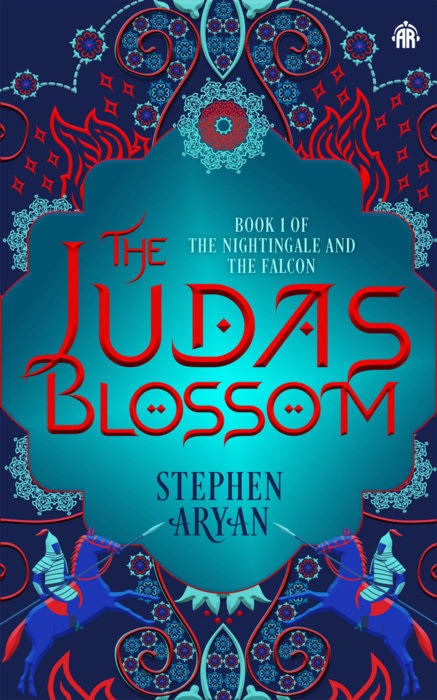 Book you're an evangelist for:
Book you're an evangelist for:
The Reapers Are the Angels by Alden Bell. I'm not much of a horror reader and only read bits and pieces. I'm also not a fan of zombie novels. This is both of those things and I absolutely love it, because it's not about the zombies. Not really. It's incredibly well-written; it's beautiful, scary, haunting, thoughtful; and the prose is sharp enough to make you bleed.
Book you've bought for the cover:
None. I always read the back of the book first.
Book you hid from your parents:
The only books I hid were fantasy novels because, to begin with, it was the only genre I would read. My parents wanted me to read other types of fiction, but I resisted. However, after a while they realised I'd get to other genres, because I soon exhausted all of the fantasy books in the local library and the school library.
Book that changed your life:
Legend by David Gemmell. The main character isn't a farm boy with a destiny. He's not a prince or a king or a knight. He's an old warrior, called back for one last fight. He's an ordinary man who built his own legend and is famous for his deeds. His reputation was earned through hard work and sacrifice, but it didn't come without a terrible cost. Legend opened my eyes to what fantasy could be. You could still have great heroes and villains, but the world is very grey and, in some ways, that makes it closer to our own than some of the earlier fantasy I read where it was very simple and clean. One of the main characters in my first novel, Battlemage, was a middle-aged, slightly overweight, balding man with grey in his beard, which came from reading Legend all those years ago.
Favourite line from a book:
"We each owe a death, there are no exceptions, I know that, but sometimes, oh God, the Green Mile is so long."
It's from my favourite book by Stephen King, The Green Mile.
Five books you'll never part with:
A Folio Society special edition of Dune by Frank Herbert. It's my favourite sci-fi novel of all time, and I treated myself to this hardback edition with paintings and a slipcase. It's gorgeous. It's not for reading, just looking at, so I'll never part with my battered, worn-out paperback copy that I actually read.
The six original paperback volumes of The Green Mile. Stephen King did an experiment, and at the time they were released in little hundred-page chunks. Now you can get a copy in one paperback, but I still have my old, worn-out, little copies, as well as a new paperback.
A signed first edition of Echoes of the Great Song by David Gemmell. It's one of my most cherished possessions, together with a signed copy of Wolf in Shadow, which I had signed when I met him a number of years ago. So that makes five books, really.
Book you most want to read again for the first time:
Dune by Frank Herbert. It blew the doors off my mind back when I first read it, and it's something I have reread many times over the years.
Book Candy
Book Candy
Open Culture explored George Bernard Shaw's famous writing hut, "which could be rotated 360 degrees to catch the sun all day."
---
Illustrator Tom Gauld on "a crisis at the library." (via the Guardian)
---
Feck, for example. Mental Floss highlighted "11 successful (and silly) euphemisms for the f-word."
---
Yale's Beinecke Rare Book & Manuscript Library featured a letter from Benjamin Franklin to Ezra Stiles "concerning measuring the temperature of snow."
Rediscover
Rediscover: Marlena Spieler
 Food writer Marlena Spieler, whose best work "combined a globe-trotting knowledge of world cuisine (she spent around a third of the year travelling) with a sunniness of tone and consistently exciting recipes," died July 6 at age 74, the Guardian reported. Hot and Spicy, her groundbreaking 1985 cookbook, "included a host of Mediterranean recipes that could easily come from one of [Yotam] Ottolenghi's books, including spiced versions of hummus and baba ganoush as well as other Middle Eastern delights such as zhoug (a fiery Yemenite green sauce seasoned with green chillies), and shakshuka, that staple of the modern brunch scene."
Food writer Marlena Spieler, whose best work "combined a globe-trotting knowledge of world cuisine (she spent around a third of the year travelling) with a sunniness of tone and consistently exciting recipes," died July 6 at age 74, the Guardian reported. Hot and Spicy, her groundbreaking 1985 cookbook, "included a host of Mediterranean recipes that could easily come from one of [Yotam] Ottolenghi's books, including spiced versions of hummus and baba ganoush as well as other Middle Eastern delights such as zhoug (a fiery Yemenite green sauce seasoned with green chillies), and shakshuka, that staple of the modern brunch scene."
Spieler wrote more than 70 cookbooks, starting with Naturally Good in 1974, and co-authored or contributed to more than 25 others. Her titles include Jewish Cooking; Best-Ever Book of Jewish Cooking; Recipes from My Jewish Grandmother; Grilled Cheese: 50 Recipes to Make You Melt; A Taste of Naples; and The Vegetarian Bistro. Her book Yummy Potatoes led to a role as an ambassador to the United Nations' International Year of the Potato conference in Peru. Above all, she wrote about the cuisines of her favorite countries, especially Mexico and Italy.
"I love garlic passionately. I yield to its voluptuous presence often, even at the point of destroying my social life," she once wrote. The Guardian noted that "her good-humored ebullience did not always endear her to the stuffier elements of British food-writing circles. Although she lived in Britain for the last 35 years of her life... her work was less recognized here than it was in her native U.S."
From 2000 to 2010, she wrote the Roving Feast column for the San Francisco Chronicle, and in 1992 she won a James Beard Award for her book From Pantry to Table: Creative Cooking from the Well-Stocked Kitchen.
"She would travel the world and bring back wonderful tales of food and adventure, and relate them all to what we were all eating and feeling here in Northern California," said Miriam Morgan, former food editor at the Chronicle. "Her recipes sparkled with life and were incredibly popular with readers.... She would come in with bags full of the most interesting and fabulous ingredients, and in a matter of minutes whip up something wonderfully delicious that we would then be able to share with our readers."
Read what writers are saying about their upcoming titles


